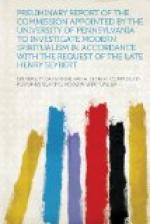4. As to Professor Scheibner. His position is simply that he cannot see how the whole series of phenomena can reasonably be attributed to jugglery, though he admits that each single thing he saw, alone considered, might possibly be. He does not regard himself, however, as able to give an opinion which should have objective value; because he was merely a passive spectator, and could not, properly speaking, make observations—could not suggest conditions,—because he knows absolutely nothing about jugglery, and the possibilities of deception, and because he is so short-sighted that he may easily have overlooked something of importance—so short-sighted that he never goes to see a juggler, because he sees nothing.
5. As to the last witness, Professor Weber, his testimony agrees more decidedly with that of Professor Zoellner. He was present at eight seances, declares the occurrences to have been as represented by Professor Zoellner, and denies that Zoellner was in any sense insane. But Professor Weber is from Goettingen, and was at the time of the investigation in Leipsic on a visit; it is not improbable that those of Professor Zoellner’s colleagues, who lived and worked at the same University with him, may have had better opportunities for judging as to his mental condition than one who only saw him occasionally. Moreover, Professor Weber’s opinion as to the qualifications of the men with whom he was associated does not seem to have been always sound. One who could look upon Professor Fechner as one of the best observers in the world, and Professor Scheibner, as for the purpose in hand, an excellent observer, neglecting entirely to note that one was partly blind and that the other could not see well, might readily overlook the fact of a not very pronounced mental aberration on the part of a third person. And as to Professor Weber’s opinion of the phenomena, it is well to note that Professor Weber was seventy-four years old at the time, had had no previous experience in investigations of this kind and was quite ignorant of the arts of the juggler. Whatever may be a man’s powers of reflection at seventy-four, it is natural to suppose that his powers of perception, especially when exercised in a quite new field, are not at that age what they were some years previously.
SUMMARY.
Thus it would appear that of the four eminent men whose names have made famous the investigation, there is reason to believe one, Zoellner, was of unsound mind at the time, and anxious for experimental verification of an already accepted hypothesis; another, Fechner, was partly blind, and believed because of Zoellner’s observations; a third, Scheibner, was also afflicted with defective vision, and not entirely satisfied in his own mind as to the phenomena; and a fourth, Weber, was advanced in age, and did not even recognize the disabilities of his associates. No one of these men had ever had experiences of this sort before, nor was any one of them acquainted with the ordinary possibilities of deception. The experience of our Commission with Dr. Slade would suggest, that the lack of such knowledge on their part was unfortunate.




